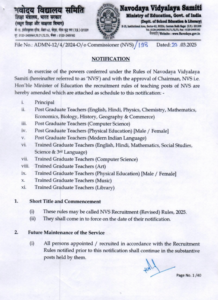
Table of Contents
NVS Recruitment Rules for Teaching and Non-Teaching Posts – Revised
Introduction
Navodaya Vidyalaya Samiti (NVS) is a prestigious autonomous organization under the Ministry of Education, Government of India. It runs a network of residential schools across the country aimed at providing quality education to talented children predominantly from rural areas. To ensure excellence in teaching and administration, NVS has revised its recruitment rules for both teaching and non-teaching posts. This update comes as a significant move to align with the current demands of the education sector and modern HR practices.
Background of NVS Recruitment
The recruitment in NVS has traditionally followed a structured format with standardized eligibility and selection procedures. However, as the educational environment has evolved, so has the need to revisit these guidelines. The previous recruitment policies, though effective in the past, were not fully aligned with modern expectations around flexibility, qualifications, and transparency.
Why the Revision Was Needed
The revised rules were introduced to respond to changes in educational pedagogy, digital literacy requirements, and evolving administrative needs. The aim was to simplify processes, eliminate ambiguities, and promote merit-based recruitment while staying compliant with government norms and reservation policies.
Key Highlights of the Revised Rules
Teaching Posts
PGT (Post Graduate Teachers)
Candidates must now possess a Master’s degree in a relevant subject along with a B.Ed. degree. A few subjects have updated specializations, and digital competency is a must.
TGT (Trained Graduate Teachers)
Graduation in specific subjects and a valid CTET qualification are essential. B.Ed. remains mandatory, and preference is given to candidates with experience in residential schools.
Miscellaneous Category Teachers
Music, Art, Physical Education, and Librarian roles now require updated degrees/diplomas with proven practical skills and certifications.

Non-Teaching Posts
These include administrative officers, accountants, clerks, lab assistants, and support staff. The revisions provide clarity on educational qualifications, computer proficiency, and experience levels required.
Educational Qualifications and Eligibility
Updated Academic Requirements
All posts have clearer and more specific academic requirements. For teaching roles, degrees must now match the subject applied for, and teacher training is mandatory.
Age Limits and Relaxations
The standard age limit ranges between 18–40 years, depending on the post. Relaxations apply for SC/ST (5 years), OBC (3 years), and differently-abled candidates (10 years).
Recruitment Process
Notification and Application
All vacancies are posted on the NVS official website and leading employment portals. Applications are accepted online with supporting documents.
Written Examination and Interview
Candidates must clear a computer-based written test followed by a personal interview. Teaching posts also require a classroom demonstration.
Reservation Policy
NVS follows the Government of India’s reservation guidelines. SC, ST, OBC, EWS, PWD, and women candidates receive reservations and relaxations accordingly.
Pay Scales and Allowances
Teaching staff are placed under the 7th Pay Commission matrix with DA, HRA, and transport allowances. Non-teaching roles follow similar scales according to their group (A, B, or C).
Promotion and Career Growth
The new rules emphasize career development. In-service teachers have better opportunities for promotion through training, performance appraisals, and seniority.
Transfer and Posting Rules
Transfers are managed based on regional/zonal preferences but may be compulsory based on administrative needs. A minimum tenure is required before requesting transfers.
Contractual vs Permanent Recruitment
Contractual teachers are hired temporarily, often annually. Revised rules now include conditions under which they can be considered for permanent roles, subject to vacancies and performance.
Impact of Revised Rules
On Teachers
Clarity in selection and promotion boosts morale and job satisfaction.
On Students
Well-qualified and trained teachers directly influence learning outcomes.
On Administration
Streamlined hiring ensures better management and reduced vacancies.
Challenges and Concerns
Implementation may face delays due to lack of awareness, remote locations, and internet access in rural areas. Training for recruiters is essential to uniformly apply the new rules.
Future Roadmap
NVS aims to digitize the entire recruitment and HR process. Continuous monitoring and periodic updates to rules will keep them relevant and responsive to the education system’s needs.
Conclusion
The revised NVS recruitment rules mark a progressive step toward modernizing the staffing processes of one of India’s most respected school systems. With enhanced clarity, inclusivity, and efficiency, these rules are set to improve the quality of education and administration across Navodaya Vidyalayas. It’s a win-win for both aspirants and the system as a whole.
FAQs
1. What are the new qualifications for PGT in NVS?
A Master’s degree in the relevant subject and a B.Ed. degree are mandatory. Some posts may require additional certifications or experience.
2. Are there age relaxations in NVS recruitment?
Yes, SC/ST candidates get 5 years, OBC gets 3 years, and differently-abled persons get up to 10 years of age relaxation.
3. How can I apply for NVS jobs?
Applications are accepted online via the official NVS recruitment portal. Check notifications regularly for new vacancies.
4. What is the recruitment process for non-teaching staff?
It usually includes a written exam followed by a skill test or interview, depending on the post.
5. Are contractual teachers eligible for permanent positions?
Yes, under the revised rules, high-performing contractual staff may be considered for regular appointments when vacancies arise.
Please don’t forget to leave a review.

